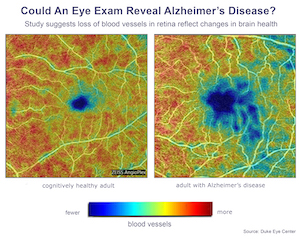The loss of blood vessels in the retina could be a signal of Alzheimer’s disease, according to a Duke Eye Center study published March 11 in Ophthalmology Retina.
Differences in the density of microscopic blood vessels at the back of the eye inside the retina were statistically significant after researchers controlled for factors including age, sex, and level of education, says Duke ophthalmologist and retinal surgeon Sharon Fekrat, MD, senior author of the study.

In people with healthy brains, microscopic blood vessels form a dense web at the back of the eye inside the retina, as seen in 133 participants in a control group. But in the eyes of 39 individuals with Alzheimer’s disease, that web was less dense and even sparse, researchers say. The study analyzed more than 200 patients at the Duke Eye Center.
“We’re measuring blood vessels that can’t be seen during a regular eye exam and we’re doing that with relatively new noninvasive technology that takes high-resolution images of very small blood vessels within the retina in just a few minutes,” Fekrat says. “It’s possible that these changes in blood vessel density in the retina could mirror what’s going on in the tiny blood vessels in the brain, perhaps before we are able to detect any changes in cognition.”

Retinal Variations
The study found differences in the retinas of those with Alzheimer’s disease when compared to healthy people and to those with mild cognitive impairment, often a precursor to Alzheimer’s disease.
Nearly 6 million Americans live with Alzheimer’s disease. No viable treatments or noninvasive tools for early diagnosis exist. Scientists at Duke Eye Center and other research centers are studying related retinal changes, such as the thinning of nerve layers, that could provide early signals of cognitive disease.
“We know that there are changes that occur in the brain in the small blood vessels in people with Alzheimer’s disease, and because the retina is an extension of the brain, we wanted to investigate whether these changes could be detected in the retina using a new technology that is less invasive and easy to obtain,” says Dilraj S. Grewal, MD, a Duke ophthalmologist and retinal surgeon who was a lead author on the study. The Duke study used a noninvasive technology called optical coherence tomography angiography (OCTA). OCTA machines use light waves that reveal blood flow in every layer of the retina.
An OCTA scan could even reveal changes in tiny capillaries -- most less than half the width of a human hair -- before blood vessel changes show up on a brain scan such as an MRI or cerebral angiogram, which highlight only larger blood vessels. Such techniques to study the brain are invasive and costly.